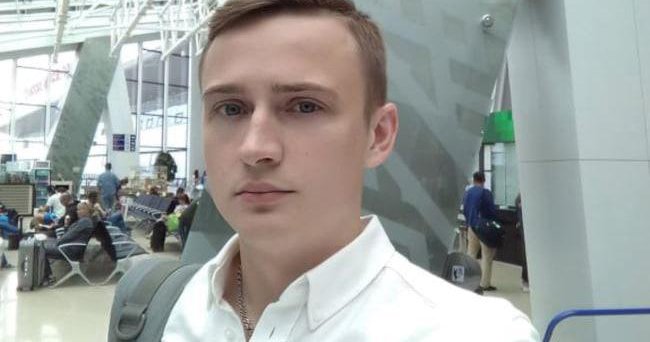
Footage from protest in Minsk, 8 November. Source: Onliner
More than a dozen people whom I met in prison told me similar stories: a person is asked for the password to their phone, they refuse, and then police officers start beating them. A young student wound up in the same police van with me when I was arrested. He also did not give up his password at first. But they began to beat him on the back of his head with the butt of a shotgun, and after the tenth blow, he agreed to give the password. Officers rummaged in his phone, found photos from other protests, but nothing happened to him as a result. The injuries, however, turned out to be serious – most likely his hand was broken (the bone was protruding from the skin), and there were symptoms of a concussion. An ambulance took him to the police station.
Another example: an officer from an organised crime unit purposefully beat my cellmate on his leg for several minutes. Having failed to obtain the password, the officer began to break the man’s fingers, saying that he would break them and nothing would happen to him. He had to stop this when detainees were transferred to another vehicle.
There was less violence at the police station and detention centre, but it still took other forms. In one police station, my cellmates later told me, people were kept in an open-air courtyard for 10 hours until they were loaded into police vans and taken to isolation wards. They talked about how people who defied the police officers were taken to the toilet and beaten, but these were already isolated cases. Most ordinary policemen – those who filled out the paperwork – guarded us, but treated us quite calmly, without aggression or humiliation.
For people at protests, the situation in Belarus’ prisons is completely different, where the main focus is humiliation and constant inconvenience. When we were taken to the prison in Zhodzina, a city northeast of Minsk, which is known for its harsh treatment of prisoners, we were forced to trample on a white-red-white Belarus flag – a popular symbol of resistance – lying on the floor as we entered. Moreover, this kind of attitude was encouraged – we were later ordered to throw rubbish at the flag, and officers regularly laid flags for us to walk on when we were taken out for exercise.
It was in Zhodzina that the most difficult, humiliating episode of my interaction with Belarusian law enforcement took place. The different wings at the prison in Zhodzina are connected via a system of underground corridors, about several hundred metres long in total. On one evening, late at night, we were led into one of the corridors, and ordered to squat down and move forward in the same squatting position.
Considering that it was three or four in the morning, and we were already exhausted, it was extremely difficult to walk. This exercise was all accompanied by kicks and blows for those who could not walk, who got up, or were simply not in favour with the guards, as well as insults and mocking shouts. When we finally reached the end of the corridor, we were placed standing, with our legs stretched wide apart along the grate – hands on the grate, palms facing us. Anyone who twitched, twisted their head or moved could be hit. We stood like this for 40 minutes – exhausted, depressed and hardly able to stand on our feet.